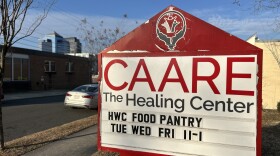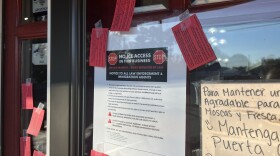Traditionally, 911 calls are handled by one of three kinds of first responders: police, firefighters or emergency medical providers.
Now, a fourth kind is spreading rapidly. Durham is among dozens of cities and counties across the nation that have added response teams built around mental health professionals. Experts say the approach is likely to become a key part of how cities interact with their citizens.
In Durham, it started with a quest for hard facts.
After the national outcry following George Floyd's murder by Minneapolis police, Durham leaders decided to dig into the nature of emergencies that prompt 911 calls — and the outcomes of police responses to them.
It led a seven-city coalition — which also included Raleigh, Cary, and Burlington — that turned to researchers at RTI International. They analyzed three years of calls and consulted with police officers.
“We asked officers to gauge the percentage of calls that had some nexus to individuals experiencing mental illness, and the responses varied, but they were saying approximately half of the calls,” said Brian Aagaard, an RTI senior researcher. "It could be something like a trespass, it could be just a welfare check. But there's a high, high percentage of calls.”
He said 911 data is labeled in substantially different ways in various communities, which made it tricky to analyze.
“But I think the thing that's consistent across sites, and that a lot of people may not appreciate, is that the vast majority of calls that law enforcement is responding to are not related to violent crime or even related to crime at all," Aagaard said.
For the cities, the study underlined some opportunities. Durham created a new Community Safety Department whose teams are better prepared to respond to certain kinds of calls.
"It may be about a mental health crisis or behavioral health needs or neighbors who need support connecting to basic resources," said Ryan Smith, who heads the new department. “There's just a whole range of calls. And investing in new types of responders that can be mental health professionals, the kind of which we have here and we're seeing in other places, just helps us be even better positioned to respond to the needs of those neighbors.”

A national trend
When Durham began fielding the response teams this past summer, it joined a fast-growing list of local governments including Denver, Albuquerque, Portland and San Francisco.
“It’s been really shocking to see how many people are interested in this,” said Gabriela Solis of Harvard University's Kennedy School of Government and Public Policy. Its Government Performance Lab started an initiative to help communities develop or expand unarmed emergency response teams.
‘We saw this big, growing consensus among jurisdictions that they wanted an alternative response, but saw that many cities were struggling to invest in those efforts and implement the changes that they wanted in a really sustainable way,” Solis added.
Her lab is working directly with nine local governments and runs a monthly call for more than 50 others to share information.
“It’s been really shocking to see how many people are interested in this."Gabriela Solis of Harvard
In the Triangle, Raleigh’s police department now has a small team including social workers to respond to crises, and Chapel Hill — a national pioneer in alternative responses — has had similar teams for half a century. But the teams in those places aren't directly dispatched. Often, they're requested by officers who have already responded to a call.
Conversely, in Durham, the community response teams answer calls without law enforcement involvement. It’s currently just a pilot program in part of downtown, but they’ve answered more than 1200 calls so far.
Durham Police Chief Patrice Andrews said initially, some police officers were skeptical of the idea.
“It was hard for officers to be able to see that this was to better assist us to handle the calls that we shouldn't be handling in the first place,” Andrews said, adding that some officers were initially concerned that the new effort was part of a larger movement to defund the police.
But she said officers now embrace the program.
“The Community Safety Department gives time back to all of our team to be able to patrol where they are most needed, to be able to respond to those violent calls that we are seeing an increase in, as well as just being able to focus on maybe some of the other proactive measures that they've wanted to do," Andrews said.
She mentioned one officer who told her he’d recently been able to find time to gather video recordings, which was crucial evidence in a property crime case he was working on.
“Just being a call taker is not anything that any of us have gotten into this profession to be," Andrews said. "You want to be more; you want to do more.”
No guns, no uniforms, no drama
On a recent morning, one of the Durham community response teams was dispatched to a convenience store. The owner reported a man was trespassing and trying to sell things outside the store.
It was someone who frequently panhandled there. By the time the team arrived, he was gone.
The team's emergency medical technician, Allison Casey, said if the man had still been around, they would have explained to him that he can't panhandle there and told him police might have to come out if he keeps doing it.
“We want to meet them where they are. We want to recognize their dignity and common humanity."Ryan Smith, Head of the Durham Community Safety Department
“And while we’re there, we’ll take that chance to say, ‘Hey listen, you’re probably panhandling because you have unmet needs,” she said. “And, like, ‘What are those needs, how can we help you address them? '”
Because they don't carry guns, wear uniforms, or drive official-looking vehicles, the teams can de-escalate the nature of their response. That's what happened in the next call the same morning, at a modest ranch-style house in a quiet neighborhood.
The caller wanted his adult daughter — whose mental health issues had become overwhelming — to move out, and she was refusing.
The three-person team included the EMT, a clinical social worker and a peer support specialist — someone who once lived on the streets or had addiction issues and can help the team build rapport with people they meet.
They pulled up to the house in a minivan, clad in cheerful, bright green T-shirts that said “HEART” on the front — an acronym for “Holistic Empathetic Assistance Response Teams” — and “Compassionate Community Care” on the back.
After talking with family members for several minutes, they got back in the minivan.
“The situation had resolved itself before we got there,” Casey said. “The person left.”
So, this call didn’t involve intense drama either. But Kirby Jones, the social worker, said it was still important.
“I’m glad that we did not have officers come out because it would have drawn resources to a call that was really unnecessary,” Kirby said.
And having police respond would have been disruptive in the neighborhood and made a hard moment for the family even harder.
Activists call for program's expansion
Because the concept of the 911-dispatched teams is new almost everywhere, cities are working to explain their role and educate citizens and politicians. The approach has grown so quickly there’s not even a settled name for them.
Durham and many other municipalities have built elaborate websites, and some even advertise.
And they network informally with each other.
“I would say I've met with probably somewhere between 30 and 50 other jurisdictions since June of 2020,” said Carleigh Sailon, the operations manager for Denver's program. “Durham came out and did a site visit with us. Hennepin County, Minnesota actually came out almost exactly a year ago. Indianapolis came out in August.
"So, this has really picked up steam."
Community response teams are only part of how local governments are tackling 911 calls in new ways. Durham is running three other pilot programs.

It has put mental health clinicians inside the emergency call center to handle certain calls more directly. It has mental health experts who co-respond with police on calls with a higher chance of violence. And it has “care navigators” to follow up with people after they meet a response team to make sure they’ve connected with the help they need.
Following the recent deaths of Black men in Memphis and Raleigh during confrontations with police, activists in Durham are calling for the expansion of unarmed response program beyond the portion of downtown where the pilot program operates.
Meanwhile, researchers at RTI International and other organizations are studying the effects of the new programs, including their impact on the use of hospital beds and jail cells, and the hours saved for law enforcement.
Solis, the Harvard project leader, said the benefits also could include a reduction in crime and shootings involving police.
“We've created this system now that we have unnecessary contact with the criminal justice system for folks who probably would be much better off with the connection to social services,” she said. “And in the worst case, we're sending law enforcement with the wrong set of tools to respond to crisis calls, resulting in terrible outcomes like excessive use of force or death for those in crisis.”
In Durham, Smith points to other potential benefits. He said the response teams can reduce the impact of a national shortage of police officers. And it might help strengthen the relationship between emergency responders and the people they serve.
“We want to meet them where they are. We want to recognize their dignity and common humanity,” Smith said. “And I think neighborliness is also a value of being welcoming and being non-judgmental. I think we really do try to be person centered, honor the dignity of each person.”







